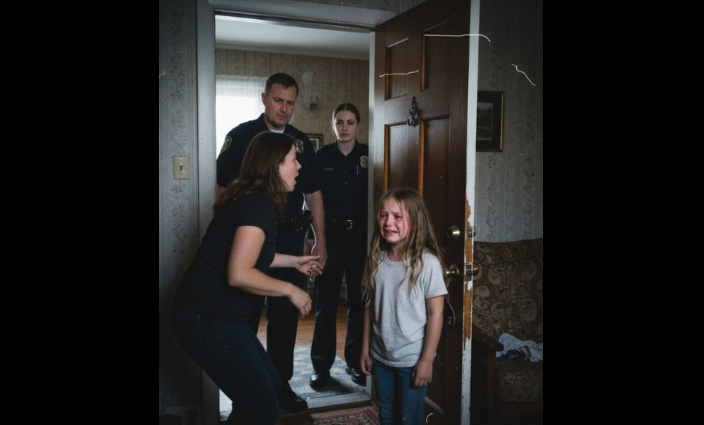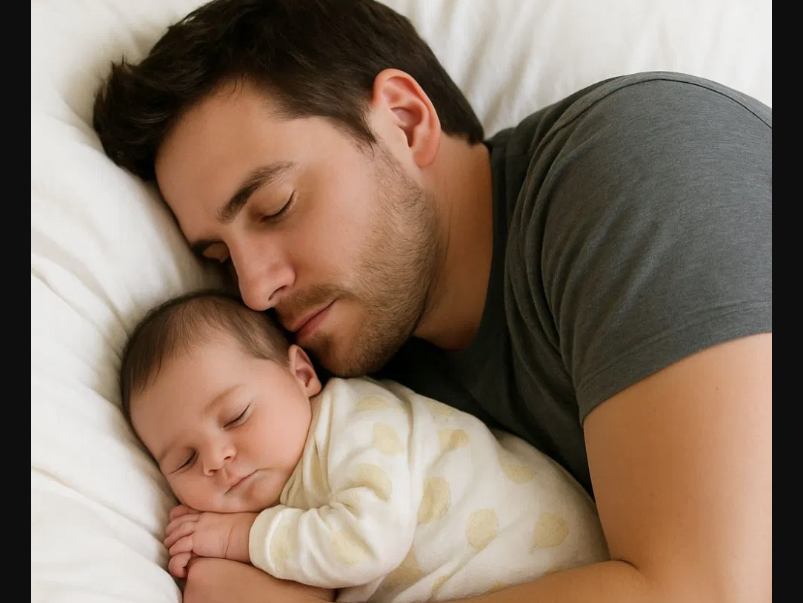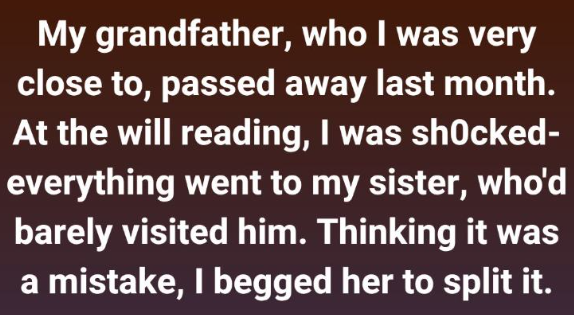The moment I swung open the door and saw two officers standing on my porch, my mind scrambled for an explanation. A mix-up, perhaps? A neighbor’s complaint about noise? A wrong address?
Then my eyes fell on Calla—barefoot, trembling, her cheeks streaked with tears—and my heart cracked wide open.
The taller officer spoke calmly. “Ma’am, your daughter came to us for help.”
A sharp, hollow laugh escaped me—not from joy, but from the surreal weight of the moment, like the world had tilted off its axis.
Calla’s gaze stayed fixed on the ground. In a small voice, she murmured, “I’m sorry. There’s something I need to tell you.”
That morning had unfolded like any other. Cereal bowls on the counter, a frantic search for a missing sock, Calla’s backpack zipper stubbornly stuck. We’d bickered briefly about her tablet—she wanted to bring it in the car, but I held firm with a no. Nothing out of the ordinary. I swear it.
I pull night shifts at the hospital, often collapsing into bed when I get home. Calla knows the drill: how to heat up leftovers in the microwave, how to keep the door locked. Since her dad left three years ago, it’s been the two of us against the world. She calls us the “Girl Fortress.”
The shorter officer asked gently if we could step inside to talk. My hands felt like ice, but I nodded and moved aside. Calla hesitated on the porch, as if crossing into the house might unravel her.
Then I noticed the emergency bracelet on her wrist—bright yellow, my phone number scrawled in Sharpie. I’d made her wear it once, years ago, when we got separated at a crowded fair. She hadn’t touched it since.
“Calla, sweetheart, what’s wrong?” I asked, dropping to my knees in front of her.
She clung to her stuffed tiger like it was her anchor.
“There’s something I saw,” she whispered. “Last night, when you were asleep. I didn’t know what to do, so I…”
Her voice broke, and she buried her face in the tiger’s worn fur.
The taller officer knelt beside me. “We don’t believe there’s immediate danger, ma’am. But Calla was scared enough to seek us out. We’d like to hear both of your stories to ensure everyone’s safe.”
Safe? I’m her mother. I work grueling 12-hour shifts to afford her sneakers and school lunches. I hold her close when nightmares wake her in the night.
I nodded, still dazed.
We settled in the living room, the half-open blinds casting harsh light across the floor. One officer asked Calla if she felt okay speaking with me present. She gave a slow nod. Then, in a voice soft but unwavering, she filled the silence.
“There was a man in the house,” she said.
I jolted upright. “What? When?”
“Last night. You were asleep on the couch.” Her eyes flicked toward the hallway. “I got up for water and saw him coming out of your room. He looked right at me.”
A chill coursed through me.
“And you didn’t wake me?” I asked, my voice trembling.
She shook her head. “I froze. I ran to my room and locked the door. I waited until morning, then ran out and found Officer Kent near the school.”
Officer Kent, the shorter one, nodded. “She approached my patrol car around 7:15 a.m. Said she couldn’t wake you and was terrified someone had broken in. She thought you might be hurt—or worse.”
I turned to Calla. “Honey, I wasn’t hurt. I took a sleep aid last night. I’ve been so exhausted lately.”
It was true. I’d been using some over-the-counter pills from work. They knocked me out hard.
But now, a shiver ran down my spine.
“Could it have been a dream?” I asked gently. “Maybe a shadow or—”
“I know what I saw,” she said, her voice sharp with conviction.
That wasn’t my shy, tiger-clutching girl. Her tone carried a fierceness I didn’t recognize.
The officers asked to search the house. I agreed without hesitation. Calla stayed close, gripping my arm, her fingers trembling in a way that told me this was no fantasy.
They checked every corner—closets, windows, even the attic. Nothing. No signs of a break-in. Nothing missing.
But one window in the laundry room was unlocked.
I never leave it unlocked.
Still, it didn’t add up. Why would someone enter our home, take nothing, and harm no one? It felt impossible.
The officers left after filing a report, saying there wasn’t much they could do without evidence. They offered Calla a junior badge sticker, which she quietly refused.
Once they were gone, I made her grilled cheese and sat her down to talk.
“What did he look like?” I asked.
She paused. “Tall. Maybe like Papa.”
My father.
“He wore a red hoodie. And his shoes… they made a weird sound. Like metal.”
I stared at her, my mind racing.
“And he didn’t speak?” I asked.
She nodded. “He put his finger to his lips, like ‘shh.’ Then he left.”
That night, every creak in the house set my nerves on edge. I checked the windows obsessively and wedged a chair under the doorknob before bed.
Sleep never came.
The next morning, after dropping Calla at school, I went to our neighbor, Mr. Oladele, who loved boasting about his doorbell camera catching raccoons or petty thieves.
“Two nights ago?” he asked, pulling up the footage. “Let’s check between 1 and 3 a.m.”
We scanned the video.
At 2:07 a.m., a figure in a red hoodie crossed our lawn.
My stomach lurched.
He didn’t come from the street—he emerged from our backyard.
The camera didn’t capture his entry point, but I watched him disappear behind our house.
He had been there.
I took the footage to the police that afternoon. They opened a case but cautioned me—no clear face, no license plate, no signs of forced entry.
Back home, I scoured the laundry room. Something was off. A basket of cleaning cloths had been nudged off the shelf. I stared at it, unease settling in.
Then I went to my bedroom and looked carefully.
Under the bed was a sock—not mine.
It was gray, with cartoon skulls, sized for a teenage boy.
I bagged it and drove straight to the station.
That night, Calla opened up fully, curled against me on the couch.
“He looked like someone I’ve seen before,” she said softly.
“Where?”
She hesitated. “I think… in the alley by the grocery store. When we park in the back. Remember when you gave that man your sandwich?”
I remembered. Three weeks earlier, I’d given a boy—no older than sixteen—half a turkey wrap and twenty dollars. He barely looked at me.
Calla had been watching from the car.
“Same hoodie,” she said.
My chest tightened.
The next day, I visited the grocery store and spoke to the owner, who knew the boy.
“Rene,” he said. “Hangs around the block. Couch surfs. Mom’s gone, dad’s in prison. Keeps to himself, mostly. Not a bad kid, but…”
But. That word carried weight.
I asked where to find him. The owner pointed me toward the train tracks.
It took two afternoons of awkward conversations, but I found Rene, sitting on a crate behind an old laundromat.
He looked up, startled, recognizing me instantly.
“You left your sock,” I said, holding up the bag.
His face went pale.
“I’m not angry,” I said quickly. “But I need to know—why our house? Why sneak in?”
He stared at his hands, picking at a fingernail. “Wasn’t gonna steal. I remembered your couch. Saw the light was off. Thought… one night.”
“You saw the couch?”
“Through the window once. When you were locking up.”
He’d followed us home.
“You scared my daughter,” I said, keeping my voice steady.
His eyes glistened. “I’m sorry. I saw her and panicked. I didn’t mean to.”
His voice—raw, trembling, desperate—held truth.
I called the police, not to press charges, but because I knew he needed more than a sandwich or a couch.
What happened next surprised me.
When the officers arrived, one recognized Rene. Said he’d once pulled a little girl from the path of a delivery van, saving her life at the last second. They let him off with a warning but added something new.
An officer named Lisa handed me a card. “There’s a youth program—housing, mentorship, job training. It’s usually full, but we have one spot. And you’ve given us a reason to use it.”
Calla and I watched from the car as they took Rene to the center.
She held my hand tightly.
“I’m sorry I didn’t wake you,” she whispered.
I looked at her. “You were so brave. You did exactly what you needed to.”
Weeks later, Rene sent a letter. He was learning to repair bikes and wanted to build one for Calla as a thank-you. She keeps the letter tucked in her tiger’s arm.
We installed new locks, window sensors, and a security camera.
But more than that, we were fortunate.
Calla trusted her instincts. I trusted her. And somehow, one small act of kindness—a sandwich given in passing—rippled back in the most unexpected, frightening way.
Here’s what I’ve come to understand:
Children notice more than we realize.
Kindness can resonate beyond fear.
And when someone—especially a child—cries for help, you listen.
If this story moved you, share it. You never know who might need the reminder.
Spread the word if you believe in the power of second chances.




